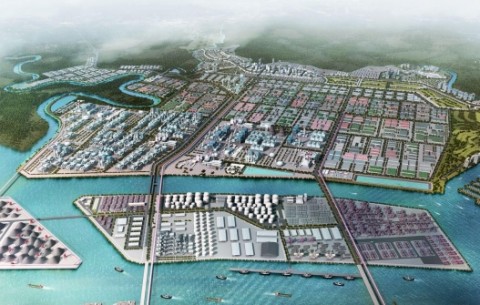Kalimantan Industrial Park to Produce EV Batteries, Petrochemical
Indonesia is building the world’s largest green industrial park in Bulungan, North Kalimantan, which will eventually produce batteries for electric vehicles, President Joko “Jokowi” Widodo claimed.
Operations in the 13,000-kilometer Kalimantan Industrial Park Indonesia (KIPI) will be powered by green and renewable energy. This includes hydropower from Mentarang and Kayan rivers in North Kalimantan, although the transition to green energy will take time.
“This is the largest green industrial park in the world. This is Indonesia’s future,” Jokowi said when he toured the project site.
The area will see the development of industries such as EV batteries, as Indonesia advances with its downstream policy and bans the export of the unprocessed ores of key minerals. The president added that there would also be petrochemical and aluminum industries at KIPI.
According to Jokowi, green energy, coupled with the “green products” that the park will make grants KIPI a competitive power. And this would also make KIPI attractive to investors, particularly those related to green products.
“If everything goes well, everyone will surely flock here, any industry related to green products will look at this area,” Jokowi said.
Jokowi told reporters that he would continue to keep an eye on the progress, so the project remains on schedule. “There are no issues on site. All permits are complete and ready,” the president said.
EV Battery Dream
Indonesia seems to be making some progress in its dream of becoming a major EV battery producer.
Aside from KIPI, the Indonesian Chamber of Commerce and Industry (Kadin) not long ago inked a memorandum of understanding (MoU) with the Western Australian government. The MoU was on exploring partnerships in critical minerals for battery and EV industries.
Australia is the world’s biggest lithium supplier. Indonesia is also the largest nickel producer in the world. Both minerals are a mainstay for EV batteries. According to Kadin chairman Arsjad Rasjid, the deal could pave the way toward the goal of becoming a major EV industry player.
“We should seize this opportunity to jointly develop a battery manufacturing plant in Indonesia using Australian lithium and lucrative investments to realize the potential of Indonesia’s nickel reserves and large workforce,” Arsjad was quoted as saying in a recent press statement.
Australian government data showed that the country accounted for 46 percent of the world’s lithium production in 2020. The US Geological Survey reported that Indonesia produced approximately one million metric tons of nickel in 2021.



